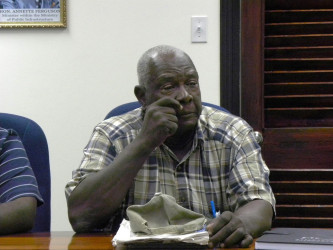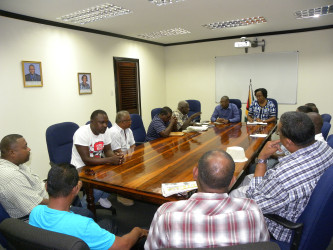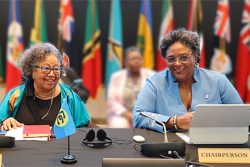Route 56 (Rosignol-New Amsterdam) minibus operators yesterday appealed to the Public Infrastructure Ministers to put measures in place to mitigate their losses since the introduction of the Berbice River water taxi service.

Members of the Route 56 Minibus Association yesterday met with both Minister of Public Infrastructure David Patterson and Minister within the Ministry Annette Ferguson to voice their concerns over the impact of the service, which was introduced last year to serve school children and the elderly during the negotiations for a reduction of the Berbice River Bridge toll.
According to a statement issued by the ministry yesterday, a dozen operators turned up at the ministry, where they received full attention from both ministers.
It noted that President (Ag) of the Association Dennis Chesney indicated that the bus drivers were “under serious pressure” since the introduction of the Berbice River water taxis.
According to Chesney, the association has seven groups of established drivers who work according to a schedule. In total, there are approximately 50 buses in the association.
He explained that before the introduction of the water taxis, a scheduled rotation had seen the operation of about four groups of drivers each day. However, since the water taxis came on stream, the daily groups have been reduced due to reduction of commuters.

“There are days when, if the four lines come out, those on the last line would not have work,” another driver said. “Three days of work is not enough… right now we don’t know where we’re headed.”
According to the ministry, the drivers stated that the situation has greatly impacted their lives and those of their families, particularly during the recent Christmas season.
“Almost all of my earnings go to paying insurance and other fees,” an emotional Chesney said.
According to the statement, while the drivers expressed pleasure with the recent news that the government brokered a $31M commuter subsidy to allow the reduction of the bridge tolls from $2,200 to $1,900, they believed that more must be done for them.
As a result, they presented a few proposals, including reduced hours of operation for the water taxis and the removal of the service on weekends.
On the former, they suggested a new schedule of 6am to 9am, followed by 3pm to 5pm. These hours, they said, would cater for schoolchildren and workers who travel during weekdays.
“At least cutting the hours would help us catch our hands,” a driver noted.
These proposals were noted by the ministers but Patterson emphasised that “decisions must not be made in a vacuum.” He noted the benefits of the service, including improved school attendance and improved business in New Amsterdam, and said that these benefits have gone a long way in bettering the lives of the public.
Patterson further said that while he understood the bus drivers’ concerns, it would not be fair to serve only one section of the populace while neglecting another.
Instead, he said common ground must be found and the impact on all relevant stakeholders must be taken into account before a final decision is reached.
Nonetheless, the ministers committed to giving serious consideration to the proposals and indicated that they would confer with technical personnel to determine the feasibility of the proposals.









